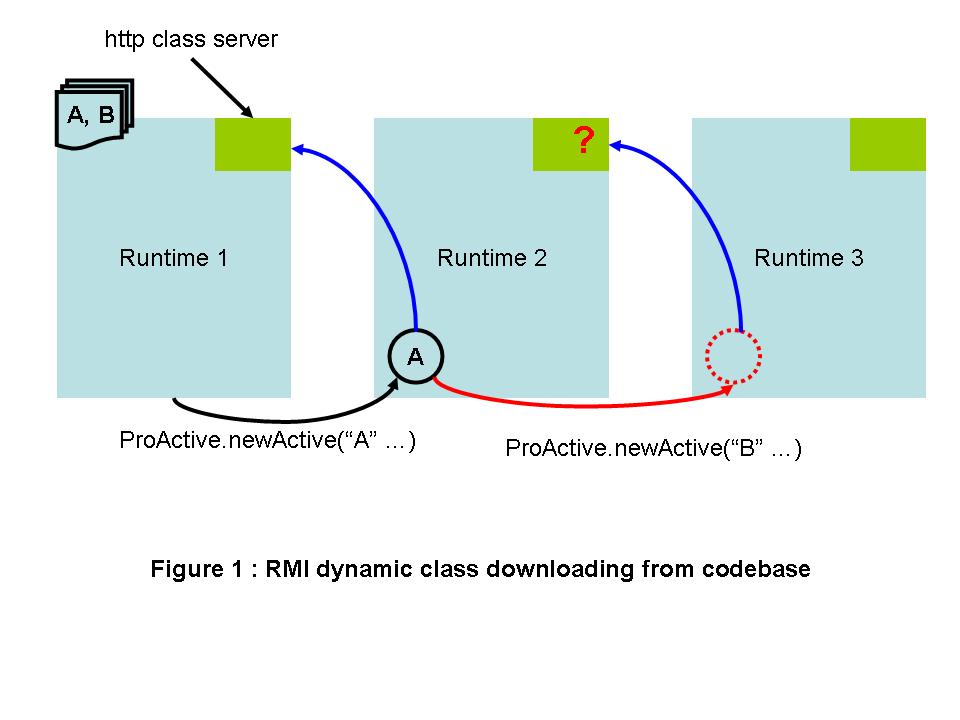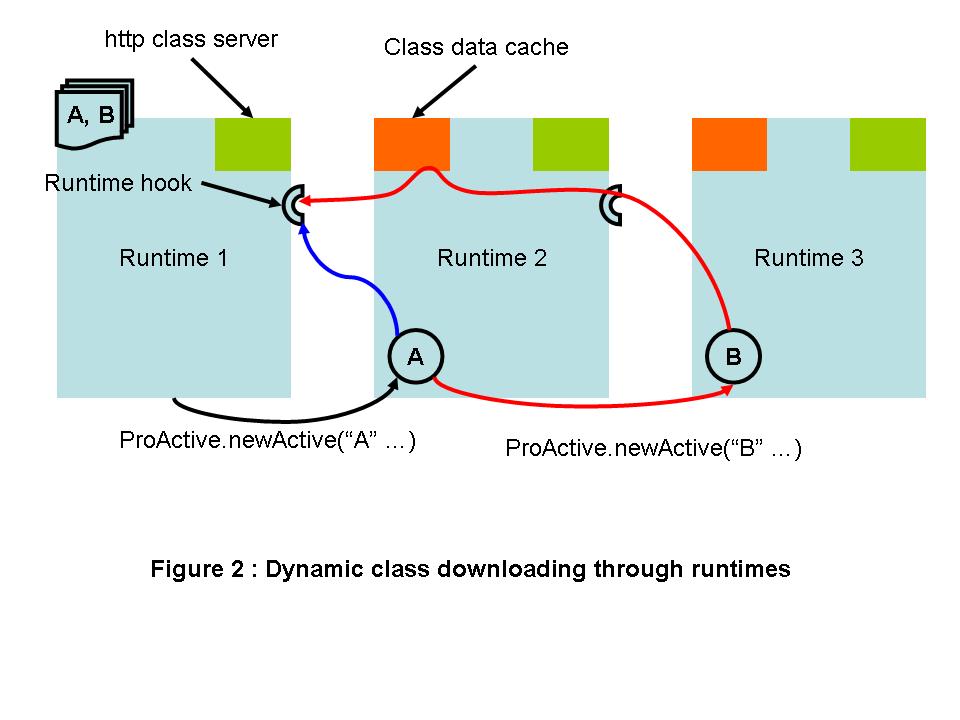
|
||||||||||
| PREV PACKAGE NEXT PACKAGE | FRAMES NO FRAMES | |||||||||
See:
Description
| Class Summary | |
|---|---|
| ProActiveClassLoader | This class defines a class loader that can fetch classes from other referenced ProActive runtimes. |
| ProActiveClassLoaderHelper | Instances of this class are created and used from the ProActiveClassLoader by reflection, in order to work in a dedicated namespace. |
| ProActiveRMIClassLoaderSpi | This class allows dynamic remote downloading of classes from other proactive runtimes when using RMI as the communication protocol, or when streams are marshalled using the RMI mechanism. |
This package holds most of the mechanism for dynamic classloading
through ProActiveRuntimes. Other classes
involved are ProActiveRuntimeImpl and ClassDataCache.
This mechanism is not the default class downloading mechanism.
It can be used for hierarchical deployment using
deployment descriptors. It provides an alternative solution to RMI
dynamic class downloading when the
codebase is not available or incorrectly set, or when http is not
available for class downloading (for instance with some firewalls setups,
or with subnetworks with private IPs).
Consider three runtimes 1, 2 and 3. We want to perform a hierarchical deployment of objects of class B. Hierarchical deployment means we initially have runtime 1, and from runtime 1 we create runtime 2 (and an active object of type A on runtime 2), the from runtime 2 we create runtime 3 (and an active object of type B on runtime 3). This kind of deployment is useful when deploying into a subnetwork with private IPs. The bytecode for classes A and B is only available on runtime 1. We will show a hierarchical deployment using the standard RMI mechanism (figure 1), then using ProActive classloading mechanism (figure 2).
If from runtime 1 someone
tries to create an active object of type A, with the standard RMI
dynamic classloading mechanism, the bytecode for A is downloaded from
the web server on runtime 1 because the ProActive Meta-Object Protocol
received the creation request as an RMI invocation and was able to read
the annotated codebase. ProActive runs a web server for distributing
classes
on each runtime, and annotations are automatic for remote invocations.
However, we have a problem if from runtime 2 we try to create an active
object of type B on runtime 3. Indeed, RMI tries to fetch class data of
B from runtime 2, but the data for B is not available on runtime 2. The
codebase points to runtime 2, not to runtime 1 where B is. B cannot be
instantiated on runtime 3.

We assume that runtime 2 is linked (through a "hook") to runtime 1 and that runtime 3 is linked to runtime 2. This linkage is automatic when the option "proactive.classloader" is enabled and when runtime 2 is created from runtime 1 and runtime 3 is created from runtime 2. In this case, whenever a class is missing in runtime 3, the runtime classloader (the RMI classloader is not used) looks for the class in the parent runtime, the runtime 2. This is done using the current inter-runtimes communication protocol, for instance RMI. Runtime 2 checks whether its local cache contains the class B, and if it doesn't, it looks for the class B in runtime 1 (and so on). It retreives the class data, stores it in the cache, and sends the data to runtime 3. B can be instantiated on runtime 3.

The ProActive class downloading mechanism is set up as follows :
- The property "proactive.classloader" should be set to "enable" in the
runtime that initiates the deployment - When a new runtime is created
from a deployment descriptor, it holds a reference on the runtime that
created it.
- This new runtime is created using ProActiveClassLoader as the
system classloader.
- If RMI is the communication protocol, a ProActiveRMIClassLoaderSpi is
also created.
The ProActive class downloading mechanism works as follows :
- new runtimes/jvms are created with the parameter
"java.system.class.loader=org.objectweb.proactive.core.classloader.ProActiveClassLoader"
- The java.system.class.loader property sets ProActiveClassLoader as
the system classloader, thus ProActiveClassLoader loads all non-system
classes. It first tries to load a class from the classpath, and if this
fails, it asks its father runtime to send the class bytecode and
defines it locally. This process is recursive : the father runtime, if
it cannot find the class bytecode, will ask its parent runtime if it
has one. Otherwise it returns null.
- When incoming streams - corresponding to remote invocations - are
deserialized, the same mechanism takes place. If RMI is the
communication protocol, the ProActiveRMIClassLoaderSpi ensures that
ProActiveClassLoader will be used to load the classes. (only works for
1.4+ jvms)
Currently, although incoming streams contain annotated classes, and therefore a reference to a http class server, the standard RMI dynamic classloading mechanism is not used at all, and dynamic downloading only occurs through inter-runtimes communications.
|
||||||||||
| PREV PACKAGE NEXT PACKAGE | FRAMES NO FRAMES | |||||||||